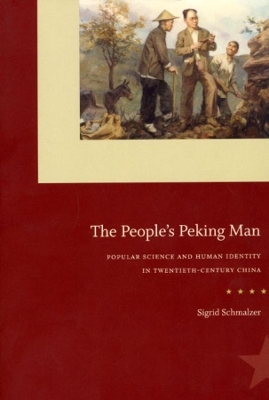
The People`s Peking Man – Popular Science and Human Identity in Twentieth–Century China
Seiten
2008
University of Chicago Press (Verlag)
978-0-226-73860-4 (ISBN)
University of Chicago Press (Verlag)
978-0-226-73860-4 (ISBN)
Offers a social history of Chinese paleoanthropology and a cultural - and at times comparative - history of assumptions and debates about what it means to be human. Focusing on issues that push against the boundaries of science and politics, this book offers an innovative approach to modern Chinese history and the history of science.
In the 1920s an international team of scientists and miners unearthed the richest evidence of human evolution the world had ever seen: Peking Man. After the communist revolution of 1949, Peking Man became a prominent figure in the movement to bring science to the people. In a new state with twin goals of crushing superstition and establishing a socialist society, the story of human evolution was the first lesson in Marxist philosophy offered to the masses. At the same time, even Mao's populist commitment to mass participation in science failed to account for the power of popular culture - represented most strikingly in legends about the Bigfoot-like Wild Man - to reshape ideas about human nature."The People's Peking Man" is a skilled social history of Chinese paleoanthropology and a compelling cultural - and at times comparative - history of assumptions and debates about what it means to be human. By focusing on issues that push against the boundaries of science and politics, "The People's Peking Man" offers an innovative approach to modern Chinese history and the history of science.
In the 1920s an international team of scientists and miners unearthed the richest evidence of human evolution the world had ever seen: Peking Man. After the communist revolution of 1949, Peking Man became a prominent figure in the movement to bring science to the people. In a new state with twin goals of crushing superstition and establishing a socialist society, the story of human evolution was the first lesson in Marxist philosophy offered to the masses. At the same time, even Mao's populist commitment to mass participation in science failed to account for the power of popular culture - represented most strikingly in legends about the Bigfoot-like Wild Man - to reshape ideas about human nature."The People's Peking Man" is a skilled social history of Chinese paleoanthropology and a compelling cultural - and at times comparative - history of assumptions and debates about what it means to be human. By focusing on issues that push against the boundaries of science and politics, "The People's Peking Man" offers an innovative approach to modern Chinese history and the history of science.
Sigrid Schmalzer is assistant professor of history at the University of Massachusetts Amherst.
| Erscheint lt. Verlag | 14.11.2008 |
|---|---|
| Sprache | englisch |
| Maße | 152 x 228 mm |
| Gewicht | 550 g |
| Themenwelt | Naturwissenschaften ► Biologie ► Humanbiologie |
| ISBN-10 | 0-226-73860-4 / 0226738604 |
| ISBN-13 | 978-0-226-73860-4 / 9780226738604 |
| Zustand | Neuware |
| Informationen gemäß Produktsicherheitsverordnung (GPSR) | |
| Haben Sie eine Frage zum Produkt? |
Mehr entdecken
aus dem Bereich
aus dem Bereich
produktiv sein ohne Stress – und mehr vom Leben haben
Buch | Softcover (2023)
dtv Verlagsgesellschaft
18,00 €
23 Techniken, um Stress abzubauen, Negativspiralen zu unterbrechen …
Buch | Softcover (2023)
FinanzBuch Verlag
18,00 €


